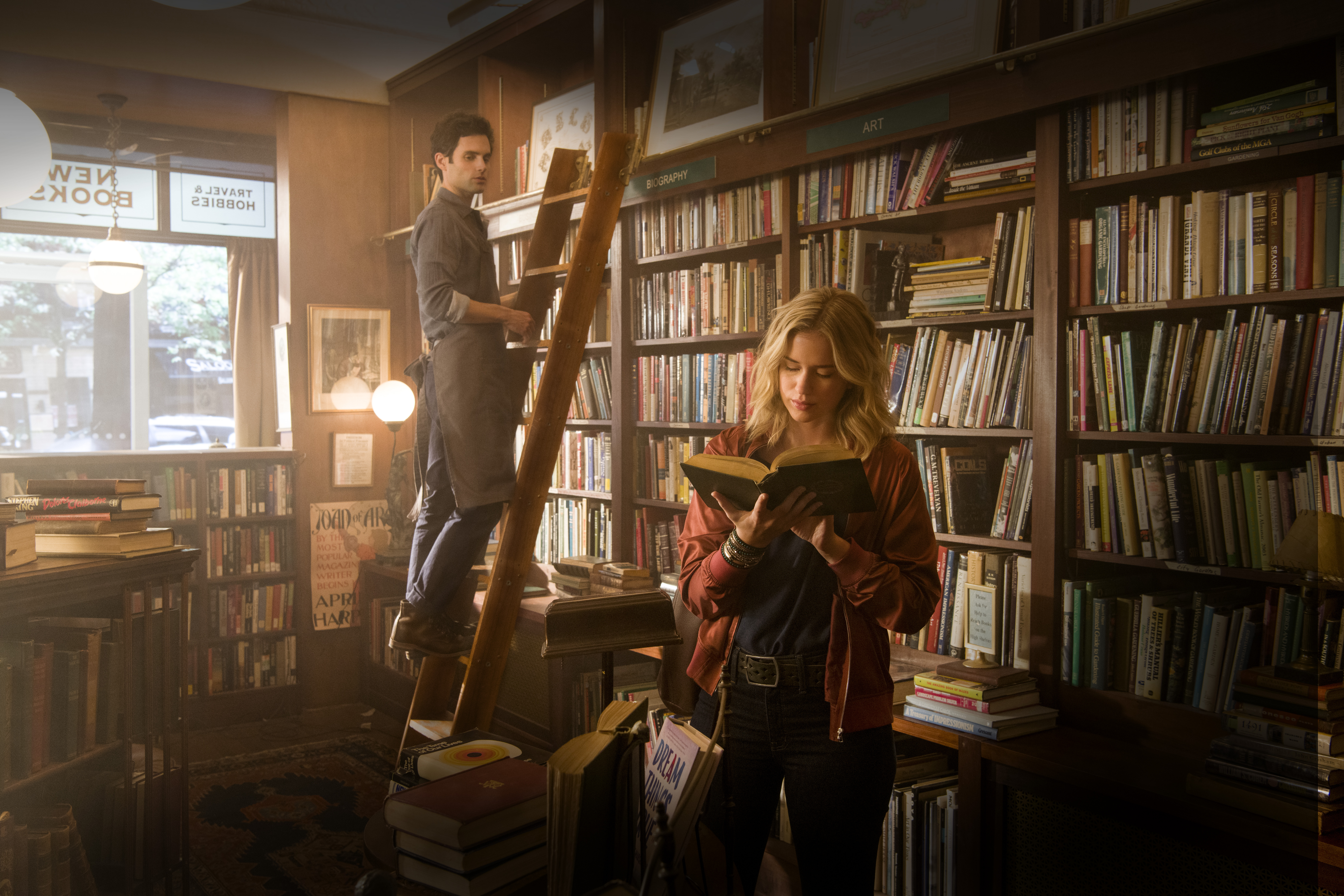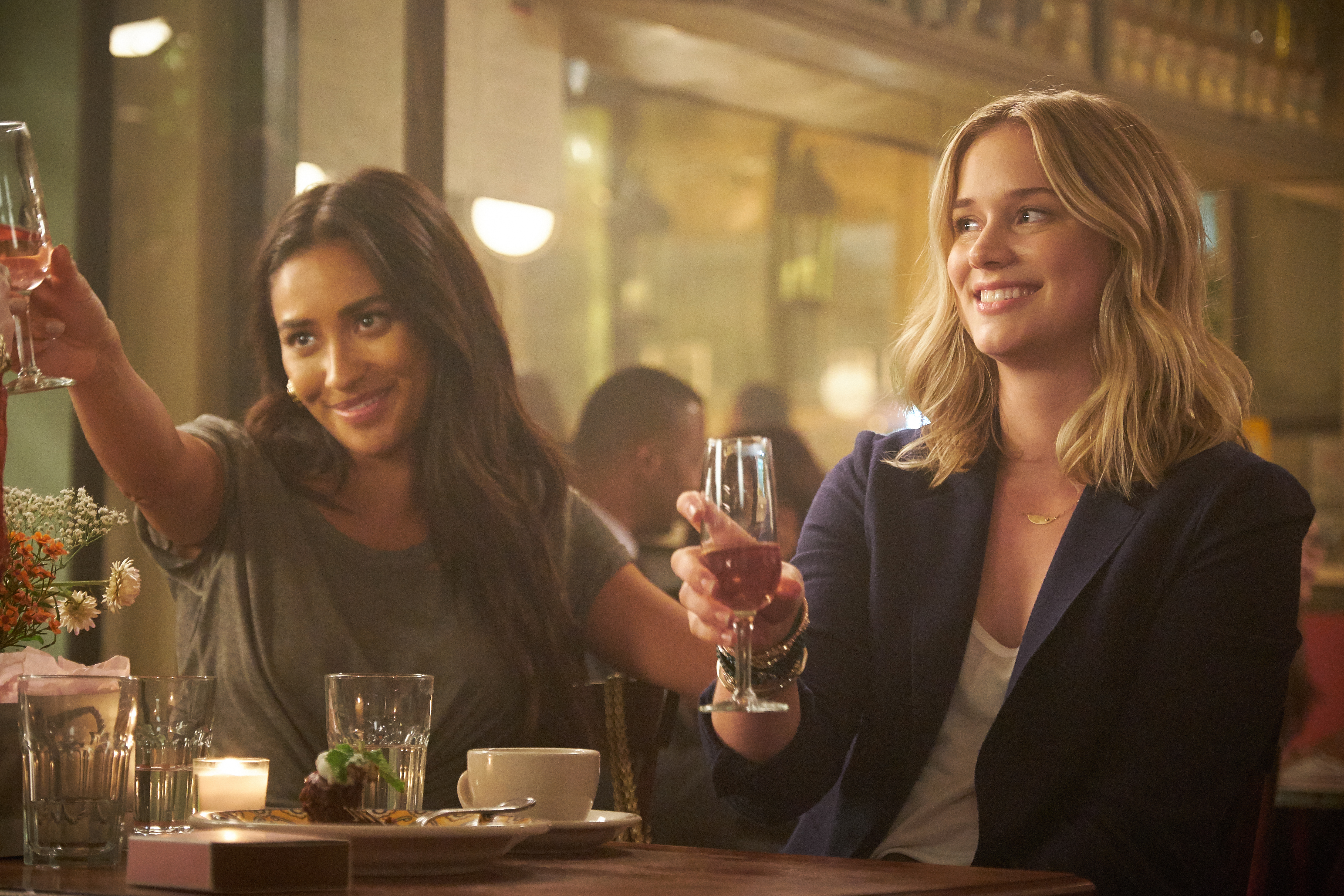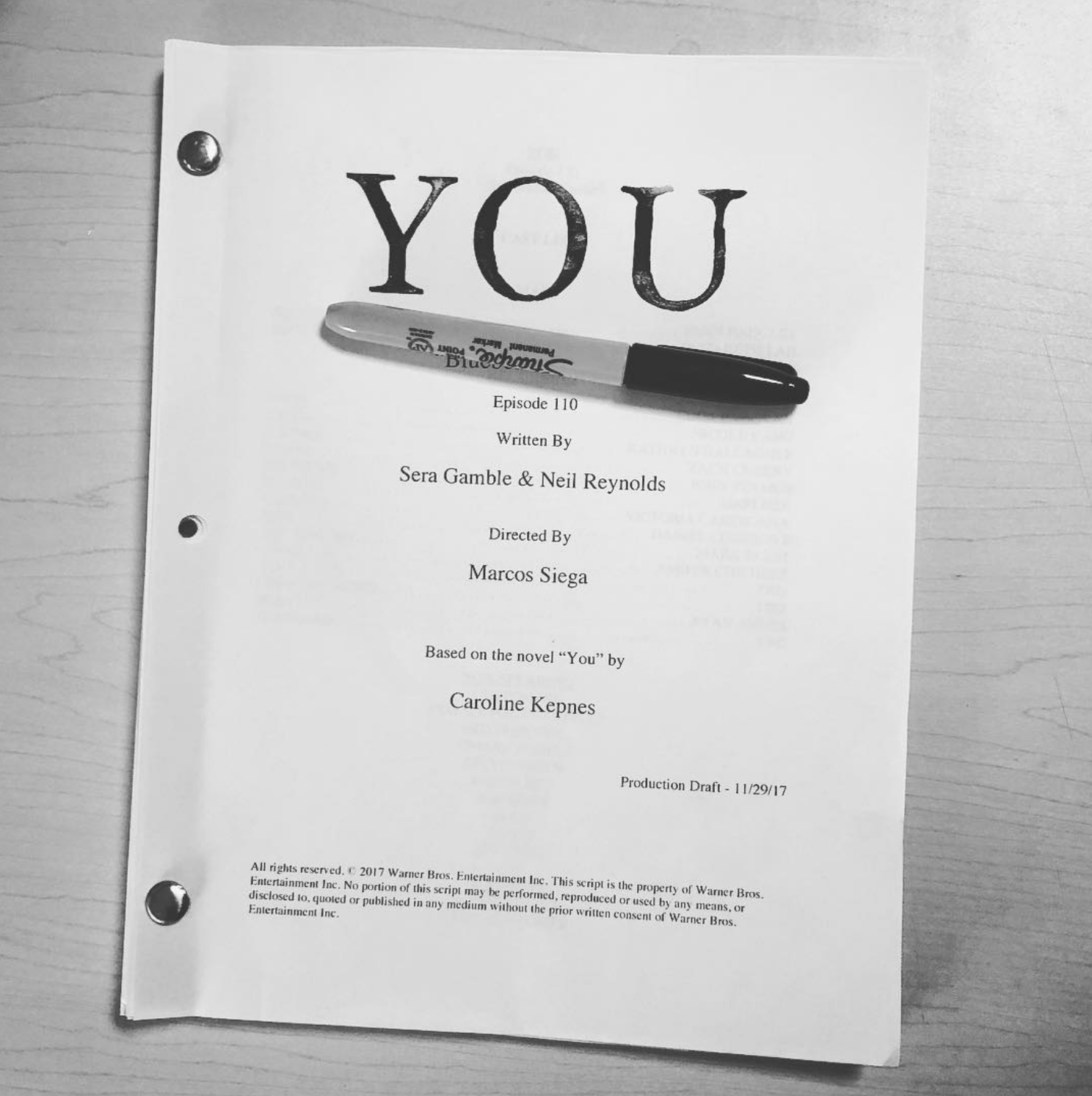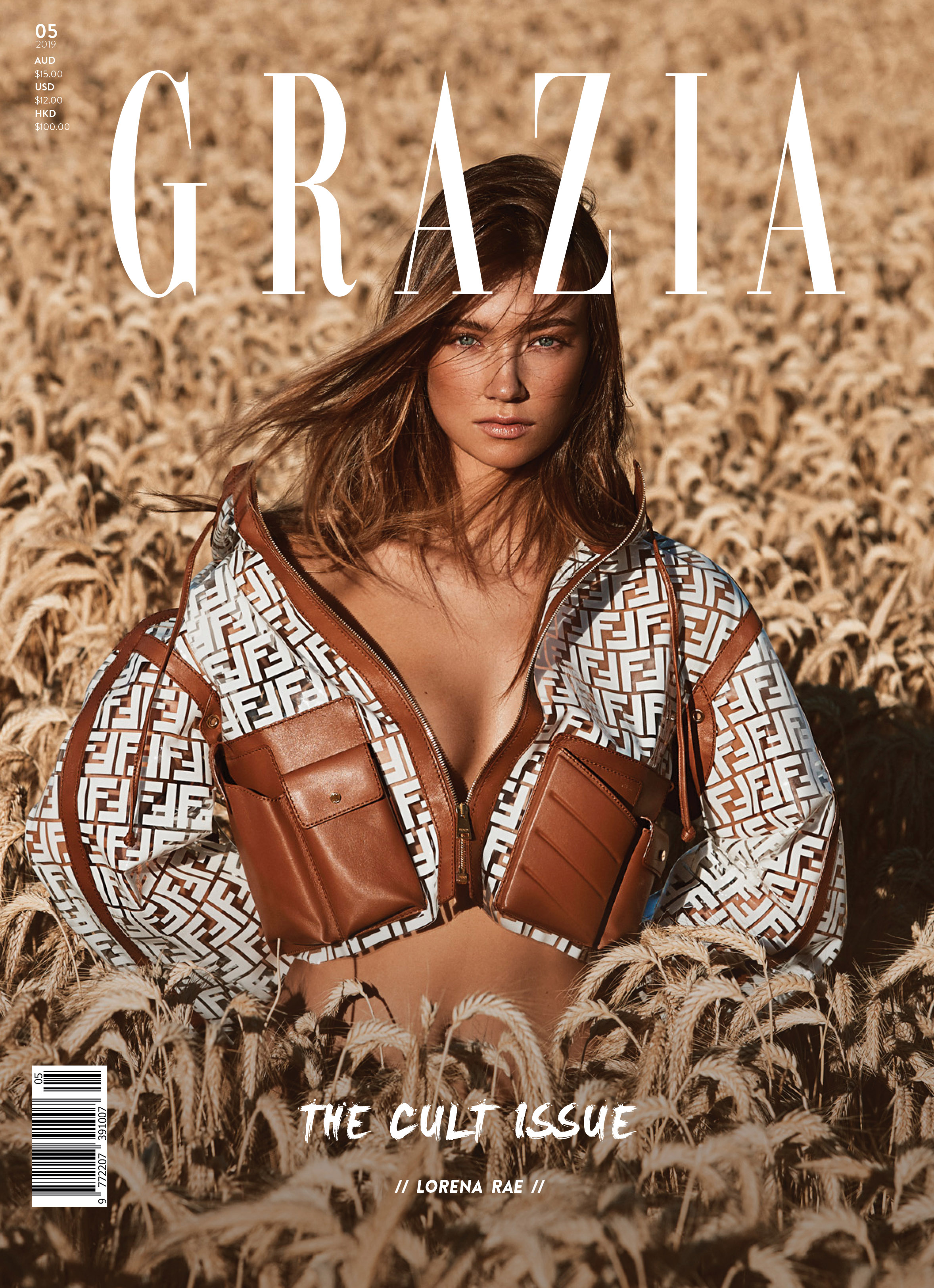News feed

“One day, you won’t need love anymore,” Guinevere Beck begins as she reads her poem on stage in the very first episode of You. “One day, you won’t walk through the world as though it was your job to hold everything up: the sun, the hard part of the night, the secret time when you wake to the sound of beating. Rise to answer the door for him, but he is not there because that sound is coming from inside you…”
This same day, the television series’ showrunner, Sera Gamble, posts Beck’s poem – in its entirety – to her Instagram. “It is, in fact, a poem I wrote when I too was a very young, very serious poet,” Gamble’s caption reads. “My theory about becoming a writer is that, over a lifetime, nothing is wasted. Not even the hundreds of pages of angst you wrote when that f***ing a**hole dumped you.” On the eve of shooting the very first scenes for the highly anticipated second season of crime drama You in Los Angeles, Gamble and I revisit the moment her young heart was fractured into smithereens – and its aftermath; pen to paper, her lovelorn soul bleeding onto the pages before her. “I wouldn’t put it past him to know it’s about him. That was a very dramatic relationship when I was young,” Gamble admits. “Now that you’re asking, I feel a tremendous amount of gratitude for that terrible, terrible time. The last thing I ever would’ve thought was that a poem I wrote while just trying to get over the heartache would be seen by 40 million people on Netflix. That’s crazy.
“Maybe it says something about me as a writer,” she adds. “That getting my heart broken was worth it because a lot of people watch the TV show.”
Based on the psychological thriller by Caroline Kepnes, You tells the story of Joe Goldberg (Penn Badgley), a charming bookshop clerk, a lover of literature and a stalker of women in New York City. Upon meeting aspiring writer Beck (Elizabeth Lail), an unhinged Joe becomes obsessed with his new girlfriend to the point where he believes his motives are purely altruistic – that great love means being able to kill anybody who might threaten the relationship, including Beck.

Gamble has struck the perfect chord between a Nora Ephron meets cute, and pop culture’s fascination with dangerous characters (hello, television series Dirty John, documentary Conversations with a Killer: The Ted Bundy Tapes and podcast The Teacher’s Pet). Here, Gamble gives us insight into her tremendously successful career as one of television’s leading writers, producers and showrunners and, of course, what’s in store for Joe Goldberg come season two.
JESSICA (GRAZIA): What do you think it is about You’s script that resonated with audiences and made this charming stalker so insanely watchable? And what do you think this says about us as a society?
SERA GAMBLE (SG): “It’s different for different audience members. But certainly something that originally attracted me to the show was the fact that it tracks so closely to the great romantic comedies that I grew up loving, that it actually points out that stalker behaviour is a lot more prevalent than we sometimes acknowledge. Our romantic notion of what love is supposed to be is a little bit unhealthy because of the culture. The show is a fun way to explore that from the perspective of a guy who has taken things way too far. But his intentions seem to be pretty closely aligned with many of us – he wants to meet the right person, he wants to be a good partner, he wants to love and be loved – he is just a little unhinged about it.”
GRAZIA: Joe Goldberg was raised on great literature, movies and romances. Which stories were your favourite growing up?
SG: “Romeo and Juliet. The beating heart of that story is about how they’re meant to be together but circumstances are tearing them apart. Early ’90s romantic comedies, like Say Anything…, also had a really big impact on me. I still feel like Lloyd Dobler [played by John Cusack] is the perfect guy in what may be a pretty unrealistic way.”
GRAZIA: If Joe didn’t have spare keys inside the glass room and he wasn’t able to get out and kill Beck, what would her life look like now? Emotionally, what type of woman would she have grown into?
SG: “Writing the character of Beck was really personal for me.
“I really put a lot of myself into her. I wanted to make sure she was driven and she had things she was really passionate about, that she had depth to her. When I was in my early twenties, I was inexperienced in life, I made a lot of mistakes, but I was determined to get somewhere.”
“I guess, the feeling that we had all season long in writing the show was that Beck makes a lot of mistakes, but that’s normal for young people as they start to navigate adulthood. If the relationship with Joe had never happened or Beck had managed to get out of the cage as it were, I think she would’ve been able to evolve and make better choices on her own. Essentially, what Joe did was remove her choice and agency. He decided that certain people and certain things were mistakes and he fixed them for her instead of letting her do it herself.”
GRAZIA: When you look back at the young writer you were when you penned that poem and you look at the showrunner you are now, how have you changed as a woman?
SG: “That’s such a great question. When I was young, I was really worried about trying to figure all this stuff out about life and love. I was worried that I was f***ing it up worse than anyone in the history of the world, that I was somehow very bad at certain aspects of relationships and maybe I was destined to have a terrible future. Now that I’ve lived for a few more years, I have realised that, on some fundamental level, most people feel that way. I have always carried around a certain amount of self-doubt. Now, this isn’t my first rodeo anymore. I have realised those feelings of uncertainty are just part of my process with work and with life – and certainly with love – where I take two steps forward and one step back. But that doesn’t alarm me anymore. That just feels familiar and I kind of love myself for it.”
GRAZIA: A showrunner of your scale is such an interesting job. How did you get your big break in the industry? And how hard was the day-to-day hustle to get there?
SG: “This is a job that has prerequisites. I worked my way up the ladder through being on the writing staff of [fantasy drama television series] Supernatural, and over a couple of years, I assumed more and more responsibility as a producer. Finally there came a day when the outgoing showrunner – and creator of the show – Eric Kripke asked me if I wanted to assume his role. I knew in that moment, when he was offering that to me, that he was giving me an opportunity that would change my career.
“Essentially, when someone is running a show, they’re being asked to captain a very expensive ship; we are talking anywhere between $US40 million to $US100 million. People who run studios are not idiots; nobody is going to hand someone the keys who’s just going to run the thing into an iceberg.”
“There is so much skill involved. I knew that what I really wanted to do was create shows from scratch, and I knew that to really retain the vision and to really retain an appropriate level of creative control, I wanted to be able to run those shows as well. But nobody was going to hand that to me. I knew that the opportunity that Eric was giving me, which was to learn how to run a show that was already a well-oiled machine – one that had been up and running for five seasons – was going to be one of the biggest moments in my life.”
GRAZIA: Do you remember how you felt?
SG: “I can tell you I wasn’t really excited at the time. I was f***ing terrified. I was really afraid I was going to screw up and get fired. I didn’t sleep for the first few months, I was just anxious and working 24 hours a day. But eventually I realised nothing was going to suddenly explode and I calmed down a little bit. You’re probably gathering from this answer that I tend to be a very conscientious person to the point of anxiety when it comes to having responsibilities. Supernatural was a really important training ground. Then, when I wrote a pilot and it got picked up, I had the necessary experience to hold my own on a set and advocate for things that I thought were important. That’s what being a showrunner affords creators. I get really passionate about young women becoming showrunners because I feel like a diversity of voices is crucial in our culture. That means empowering those writers, artists and creators to be able to defend their work because they’re able to manage stuff like budgets and schedules as well; that’s what actually gives you the power in television.”
GRAZIA: Were there many female showrunners back when you were promoted in 2010?
SG: “No. There aren’t that many now. I think 80 per cent or so of showrunners are male. It’s a sea of dudes. It’s changing, [but] it could afford to change some more.”

GRAZIA: What was one of the biggest obstacles you had to overcome to get where you are now?
SG: “If you’re a TV writer and producer, you have to have a lot of grit and tenacity and you have to roll with a lot of rejection. I have literally never seen it happen overnight for anyone. No TV is made overnight; you just have to be in it for the long haul and work with a lot of different personalities. When I think about my career up until this point, it doesn’t really feel punctuated by so many explosions. The metaphor that comes to mind is that it feels like I became an athlete and I worked harder and harder on my endurance and my ability to lift giant things in an effort to be able to function at this high level, where I can now manage a lot of things and wear a ton of hats in a day.”
GRAZIA: What does your space look like when you’re writing?
SG: “It changes a little from project to project, but I frequently enjoy a little bit of noise and distraction. I’ve always really loved to write in cafes. First of all, there is caffeine readily available, which is my very favourite drug. Sometimes I’ll wear headphones and they’re not even on because what I really want to do is eavesdrop on the people at the next table. My favourite is to be in a place where nobody is going to bother me but I can kind of be around the hustle and bustle of humans, because that is what I’m writing about.”

GRAZIA: During the first season of You, your Google history literally contained searches on “How to remove bloodstains from the apartment hallway” or “How to dissolve a body”. What will your Google history look like in season two?
SG: “[Laughs] It would definitely be used against me in a court of law. Without giving too much away about season two, my Google history is now more about Los Angeles, because Joe comes to LA in season two but it still makes me look like someone who wants to dispose of a lot of bodies. I’ve learnt more than I ever imagined I would about all the many ways you can get rid of bodies and body parts from working on the show. It’s simultaneously repulsing and fascinating.”
GRAZIA: What’s on your reading list at the moment?
SG: “I have been reading a lot of stuff about Los Angeles for season two of You. My favourite reads right now are food reviews by the late, Pulitzer Prize-winning food critic Jonathan Gold. He wrote about Los Angeles for many years, kind of under the disguise of writing about food, but really he was writing about cultural diversity and all the different kinds of people you can encounter in LA while you’re searching for the perfect taco. It’s also like a little bit of a spoiler for season two.”
Follow Sera on Instagram @seragamble
https://www.youtube.com/watch?v=cKOhno0IMpA










